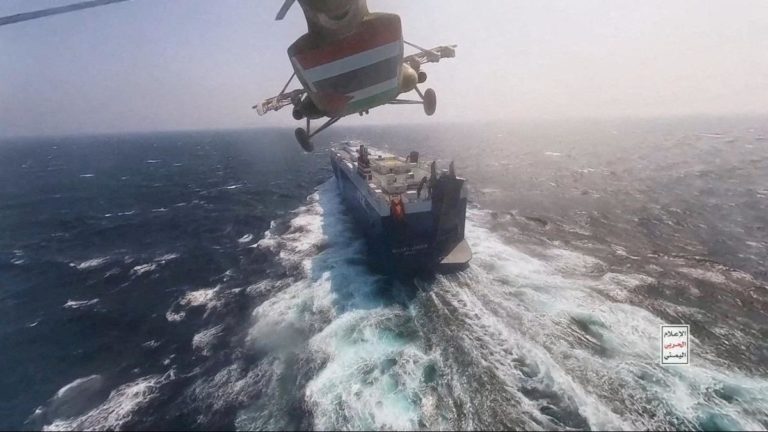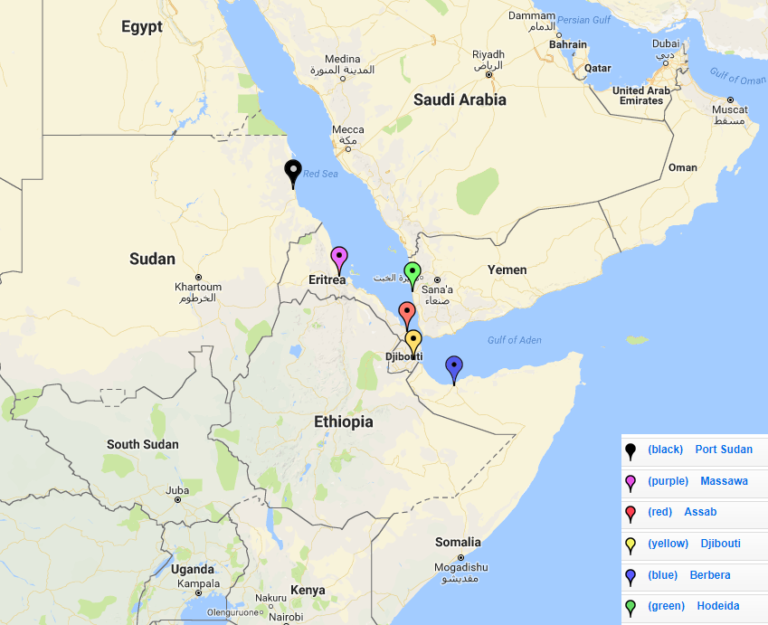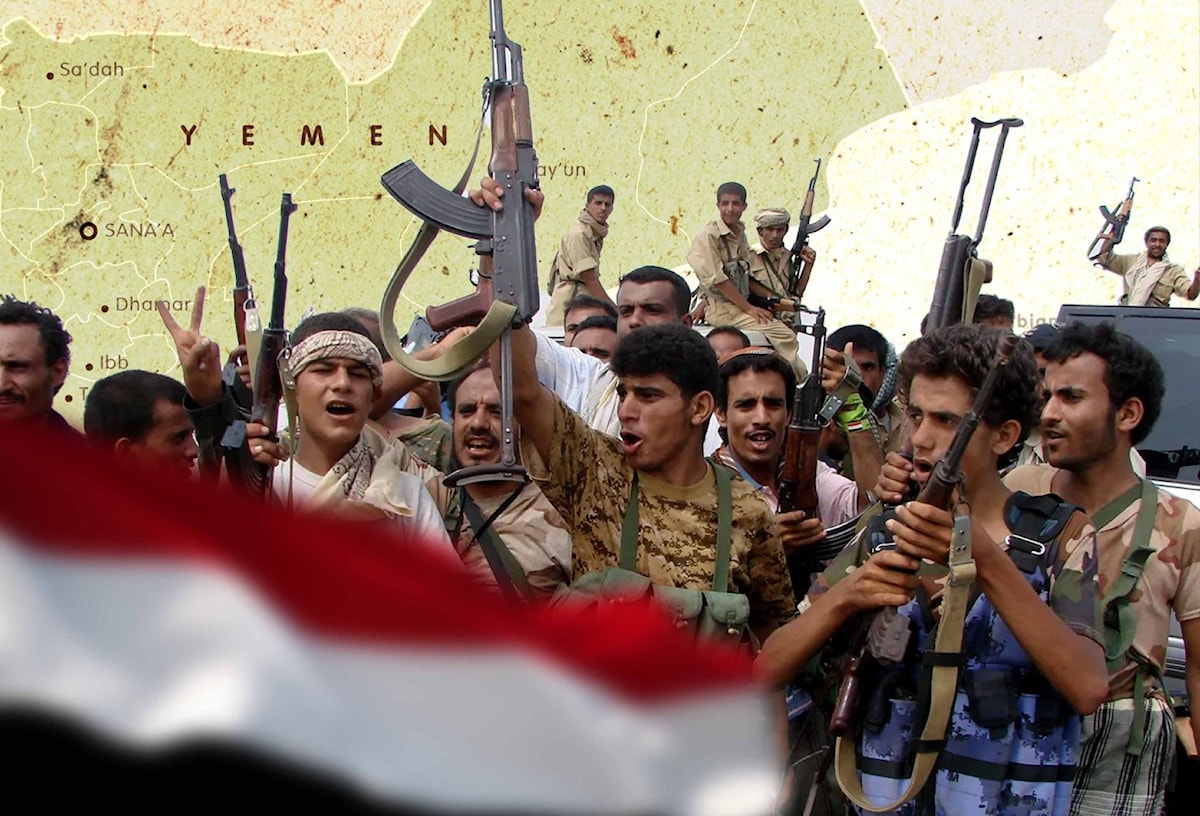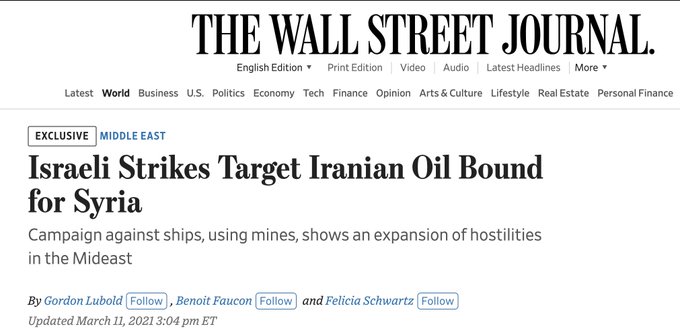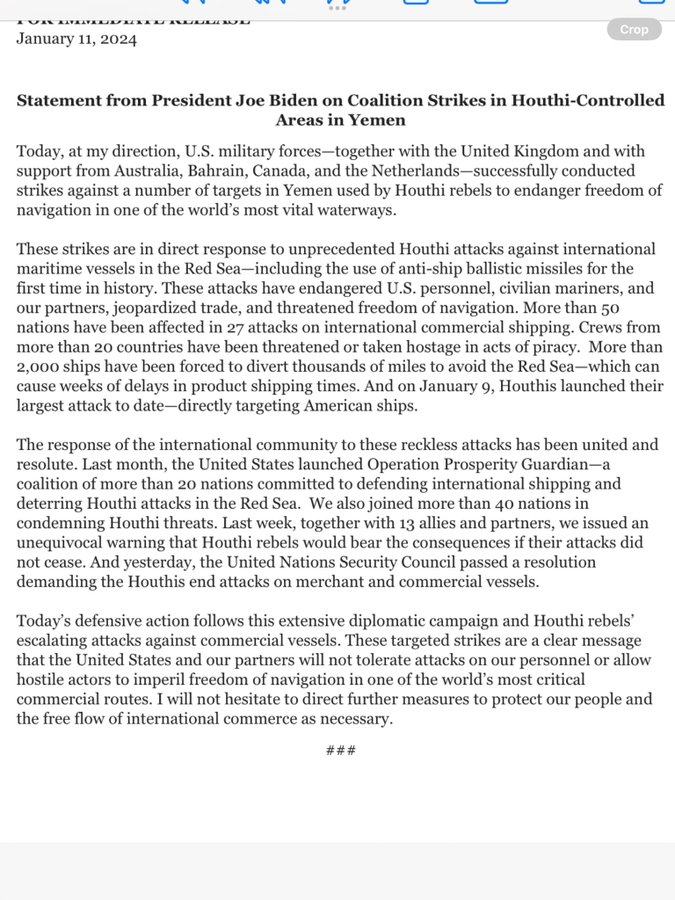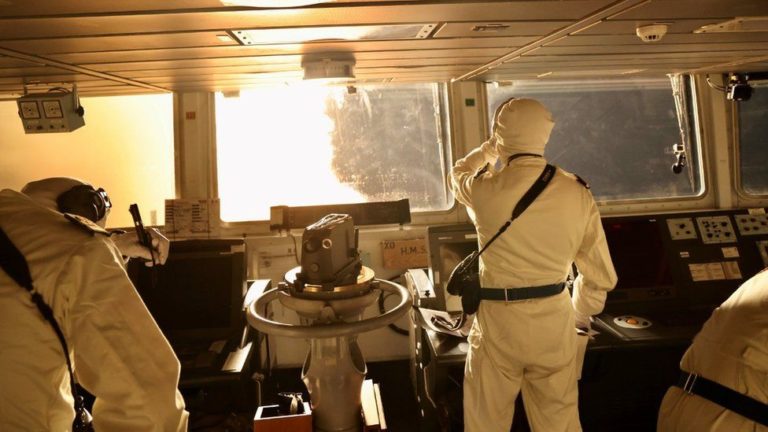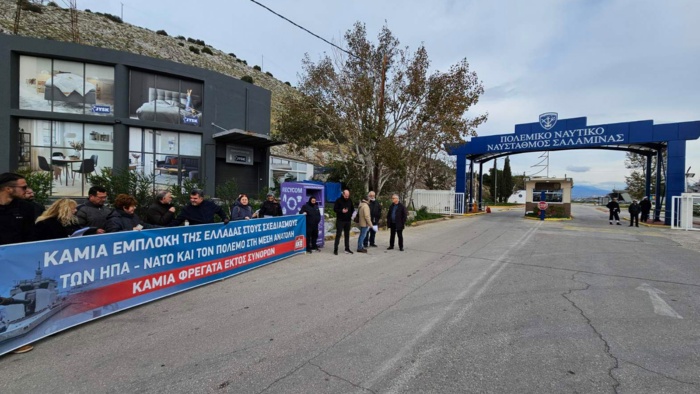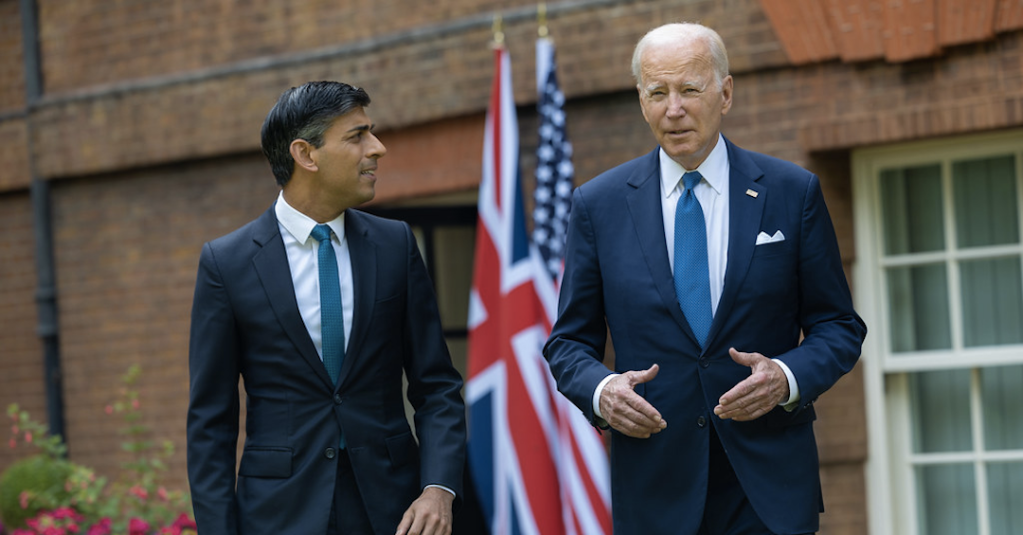Sanaa reportedly rejected Washington's attempts at direct communications regarding the Yemeni armed forces' tactics against Israeli-linked vessels in the Red Sea
News Desk
DEC 19, 2023

(Photo Credit: US navy)
US Secretary of Defense Lloyd Austin announced on 18 December the creation of a multi-national coalition “to uphold the foundational principle of freedom of navigation” in the Red Sea.
“I am announcing the establishment of Operation Prosperity Guardian, an important new multinational security initiative under the umbrella of the Combined Maritime Forces and the leadership of its Task Force 153, which focuses on security in the Red Sea,” Austin’s statement reads.
Under the leadership of the already existing Task Force 153, set up in April of this year to “improve maritime security and capacity building” in the Red Sea, Bab al-Mandab, and the Gulf of Aden, the nations included in Operation Prosperity Guardian are the UK, Bahrain, Canada, France, Italy, the Netherlands, Norway, Seychelles, and Spain.
Several other nations have reportedly agreed to be involved in the naval task force but “prefer not to be publicly named,” an unnamed US defense official told POLITICO.
The nations taking part in Washington's scheme will “jointly address security challenges in the southern Red Sea and the Gulf of Aden, with the goal of ensuring freedom of navigation for all countries and bolstering regional security and prosperity,” Austin said.
Mohammed Ali al-Houthi, a high-ranking member of the Supreme Political Council in Yemen, said on social media: “[The US] repeatedly sought direct communication with the Republic of Yemen in Sana’a, but this was rejected.”
"It brings no honor to communicate directly with the killers of children of Gaza and Yemen,” he added, stressing that "[the US] are the terrorists.”
The formation of this Red Sea coalition follows the threats and attacks on Israeli-linked commercial vessels from Ansarallah and the Yemeni armed forces in solidarity with the Palestinian people.
This situation forced major shipping companies to suspend their operations in the Red Sea.
Washington has pressured other nations to join the coalition. One of these is Saudi Arabia, which the US is reportedly pressuring to delay signing a peace agreement with Yemen.
Mohammed al-Bukhaiti, senior political official and spokesman for Ansarallah, has previously said, “If Saudi Arabia and the UAE are part of any coalition to attack Yemen, we will not leave an oil field or a gas field in Saudi Arabia or the Emirates, and we will target all ships transporting oil.”
The US war chief arrived in Israel on Monday to speak with senior Israeli leaders, including Israeli Prime Minister Benjamin Netanyahu and Defense Minister Yoav Gallant.
“Attacks by extremist settlers against Palestinians in the West Bank must stop, and those committing the violence must be held accountable,” Austin said during a joint press conference.
“It would compound this tragedy if all that was waiting for the Israeli people and your Palestinian neighbors at the end of this awful war was more insecurity, fury, and despair,” the secretary of state added. “As I have said, Israelis and Palestinians have both paid too bitter a price to just go back to October 6.”
https://new.thecradle.co/articles/penta ... in-red-sea
*******
THE U.S. NAVY IS UNPREPARED FOR A PROLONGED WAR WITH YEMEN
19 December 2023 by Larry Johnson 145 Comments

Aegis Missile Defense System
It looks like the United States, along with 9 allies — Great Britain, Italy, Bahrain, Canada, France, the Netherlands, Norway, Seychelles and Spain — are on the verge of entangling itself in a new Middle East quagmire as an international armada assembles in the international waters around Yemen. The mission? Stop Yemen from threatening cargo and oil tankers headed to Israel.
Tiny Yemen has surprised the West with its tenacity and ferocity in attacking ships trying to ferry containers and fuel to Israel. Yes, this is a violation of international law and the West is fully justified in trying to thwart Yemen. On paper it would appear that Yemen is outnumbered and seriously outgunned. A sure loser? Not so fast. The U.S. Navy, which constitutes the majority of the fleet sailing against Yemen, has some real vulnerabilities that will limit its actions.
Before explaining the risks, you must understand that the U.S. Navy is configured currently as a “Forward-Based Navy” and is not an “Expeditionary Navy.” Anthony Cowden, writing for the Center for International Maritime Security in September, examined this issue in his article, REBALANCE THE FLEET TOWARD BEING A TRULY EXPEDITIONARY NAVY.
Today we have a forward-based navy, not an expeditionary navy. This distinction is important for remaining competitive against modern threats and guiding force design.
Due to the unique geographical position of the U.S., the Navy has the luxury of defending the nation’s interests “over there.” Since World War II, it developed and maintained a navy that was able to project power overseas; to reconstitute its combat power while still at sea or at least far from national shores; and continuously maintain proximity to competitors. This expeditionary character minimized the dependence of the fleet on shore-based and homeland-based infrastructure to sustain operations, allowing the fleet to be more logistically self-sufficient at sea.
However, late in the Cold War, the U.S. Navy started to diminish its expeditionary capability, and became more reliant on allied and friendly bases. A key development was subtle but consequential – the vertical launch system (VLS) for the surface fleet’s primary anti-air, anti-submarine, and land-attack weapons. While a very capable system, reloading VLS at sea was problematic and soon abandoned. While an aircraft carrier can be rearmed at sea, surface warships cannot, which constrains the ability of carrier strike groups to sustain forward operations without taking frequent trips back to fixed infrastructure. The Navy is revisiting the issue of reloading VLS at sea, and those efforts should be reinforced.
The next step the Navy took away from an expeditionary capability was in the 1990s, when it decommissioned most of the submarine tenders (AS), all of the repair ships (AR), and destroyer tenders (AD), and moved away from Sailor-manned Shore Intermediate Maintenance Centers (SIMA). Not only did this eliminate the ability to conduct intermediate maintenance “over there,” but it destroyed the progression of apprentice-to-journeyman-to-master technician that made the U.S. Navy Sailor one of the premier maintenance resources in the military world. Combat search and rescue, salvage, and battle damage repair are other areas in which the U.S. Navy no longer has sufficient capability for sustaining expeditionary operations.
So what? Each U.S. destroyer carries an estimated 90 missiles (perhaps a few more). Their primary mission is to protect the U.S. aircraft carrier they are shielding. What happens when Yemen fires 100 drones/rockets/missiles at a U.S. carrier? The U.S. destroyer, or multiple destroyers will fire their missiles to defeat the threat. Great. Mission accomplished! Only one little problem, as described in the preceding quote — the U.S. Navy got rid of the ship tenders, i.e. those vessels capable of resupplying destroyers with new missiles to replace the expended rounds. In order to reload, that destroyer must sail to the nearest friendly port where the U.S. has stockpiled missiles for resupply.
Got the picture? If the destroyer must sail away then the U.S. carrier must follow. It cannot just sit out in the ocean without its defensive screen of ships. The staying power of a U.S. fleet in a combat zone, like Yemen, is a function of how many missiles the Yemenis fire at the U.S. ships.
But the problems do not stop there. Each of the Aegis missiles, as I noted in my previous post, cost at least $500,000 dollars. A retired U.S. DOD official told me today that the actual cost is $2 million dollars. If Yemen opts to use drone swarms to saturate the battle space around a carrier, then the United States will firing very expensive missiles to destroy relatively inexpensive drones. This brings up another critical vulnerability — the U.S. only has a limited supply of these air defense missiles and does not have the industrial capability in place and operating to produce new ones rapidly to make up the deficit.
Getting the picture now? The U.S. Navy may find itself having to sail away without finishing the job of eliminating the drone/missile threat from Yemen. How do you think that will play in the rest of the world? The mighty Super Power having to retreat to rearm because it could not sustain intense combat operations. This is not classified information. It is published all over the internet. If I can figure this out then I am certain that U.S. adversaries, not just Yemen, realize they have a way to give the U.S. a very bloody nose in terms of damaged prestige.
What happens if Yemen is able to sink one or two U.S. Navy ships? Then the shit really hits the fan. The United States does not have a magical supply of missiles squirreled away to deal with this contingency. The U.S. ships would have to sail away to rearm after picking up the survivors from a sundered ship.
Then there is the problem of finding the mobile missile platforms in Yemen. Remember the problems the United States had in Iraq in 1991 trying to find and destroy SCUD missile launch systems? While ISR systems are better today, there is still no guarantee of being able to locate and destroy in a timely manner. The Yemenis have more than 8 years experience dealing with U.S. ISR and U.S. drone attacks. On November 9th the Yemenis shot down a MQ-9 Reaper drone. That baby costs a little more than $30 million dollars.

Here is the bottomline. The United States flotilla, along with its allies, can do some damage to Yemen but are unlikely to achieve a decisive victory. Yemen, for its part, can inflict some serious damage to some of the ships — maybe even sink one or two — and by doing so, score a moral victory that will fuel doubts about America’s naval capabilities and staying power. Perhaps this explains why the U.S. has been so slow to respond to the attacks launched by Yemen.
https://sonar21.com/the-u-s-navy-is-unp ... ith-yemen/
The world is a better off place because the US does not have an "Expeditionary Navy.” Bad enough as it is....
Even as capitalism is the true rationale for monstrous military strength so capitalism has also been the scourge of real military efficiency when what the vendor has to sell trumps what the military really needs. In terms of goals to means this could be as much a debacle as Afghanistan.
******
US, Allies Opening New Front in Middle East With Escalation Against Houthis Over Shipping Lanes
Posted on December 20, 2023 by Yves Smith
What at the moment looks like the irresistible force of Houthi attacks against shipping in and out of Israel is meeting the seeming immovable object of Israel determination to render Gaza uninhabitable. But the US and a set of allies1, via the too-cutely named Operation Prosperity Guardian, are making a major naval force commitment to the Red Sea to try to counter the Houthi success in severely curbing traffic though the critically important Bab el-Mandeb Strait.
Keep in mind the Houthis insist they are seeking only to restrict shipping in and out of Israel. But major cargo operators have stopped servicing the Red Sea area as insurance prices have spiked. So we have the spectacle of the US, a supposed naval power, unable to protect critical sea lanes. Can’t have that, now can we?
Mind you, it is not clear what good a convoy, which looks to be the immediate response, will do in the face of drone and ballistic missile attacks. Yes, it will put more defensive firepower in the theater. But the number of missiles and difficulty of resupply means there is a possibility, even a pretty good one that the Houthis can simply exhaust the firepower that can be delivered via the Operation Prosperity Guardian warships.
And that’s before getting to logistics issues, that to a degree, maybe a big degree, various vessels have particular launch platforms, so missiles are not very fungible across ships. So this the convoy could wind up being a high cost temporizing measure. Would the West try to move to a Plan B before it became hopelessly evident that it was outmatched by the proverbial guys in sandals, now with the force levelers of drones and ballistic missiles? Of course, events in the from of damage to convoy ships could overtake events.
So what might next steps be, if the big bad Western forces fail to trounce the Houthis quickly? Maybe the Biden Administration works up the nerve to tell Israel no more weapons for you if you don’t cut it out in Gaza. You can be sure the hawks will call for strikes on Iran to make them rein in the Houthis (when I doubt Iran has operational control) and/or a ground attack on Yemen. I consider the latter to be nuts. We saw from the Gulf Wars it took months to pre-position men and weapons, and that was when we had a better army. And by all accounts, the Houthis would be as hard as the Afghanis to defeat, between their native tenacity, their very decentralized structure, and the defense-friendly terrain.
Troublingly, it’s not hard if there is not a resolution to this impasse pretty soon, that Israel could see that as justifying a tactical nuclear strike on Yemen or Iran, the Houthi’s sponsor.
We’ll pause for a moment and provide what is hopefully a more complete overview. One came from reader Boomheist yesterday:
A couple days ago it was reported than 45 ships, container, had chosen to reroute around Africa from the Suez and Red Sea. Yesterday reports stated the number was now over 65, I think, plus at least one tanker company, BP, also rerouting its ships. Other headlines this morning are stating that essentially the Red Sea is closed, with a lot of ships on hold awaiting the start of naval escorts.
The governing assumption, looking at the many “X” feeds by those in the maritime sector, seems to be a triumphant sense that hooray, finally the great US Navy and its allies are going to weigh in and snuff out the Houthis and thus re-secure the Red Sea approaches and the traffic. Within a few days we will see Operation [Prosperity] Guardian stand up and shortly after see the Houthis rendered toothless; ie, these armed destroyers will shoot down all the drones and missiles fired, as one US destroyer claimed the other day with shooting down 14 missiles and drones. Yet we see some other feeds doing some math showing the total number of such protective missiles aboard naval ships is limited to, perhaps, 800 and if the Houthis have thousands of smaller missiles and drones they can then overwhelm this naval task force and render the empire toothless. It is one thing to wave the flag and steam around looking scary. It will be another if a drone swarm overpowers a destroyer and takes it out of action, even sinks it, or if a swarm damages a commercial ship being protected by this naval force.
One scenario, the triumphant one, holds that this Operation [Prosperity] Guardian will show to one and all the US Navy and allies are Not to be Messed With and the Houthi dangers an irritant that can be handled such that Red Sea traffic resumes and this blip in world trade and Suez use will return to normal within a week or two. The other scenario, the pessimistic one, holds that the naval task force is toothless against drone swarms and damaged commercial ships, such that the Suez eventually closes and world trade is chaotically disrupted.
The latter scenario has another element – let’s for the moment assume Those in the Know know full well the current situation, thousands of Houthi asymmetrical weapons, can overwhelm whatever this task force has over a very short time period. Then the only solution is to somehow reduce that number, by blasting storage depots and also by directly attacking Iran and China, the assumed sources of at least the missiles. This will take time, during which the Suez remains closed. This will become a war between the US and Iran and maybe even China.
If this asymmetrical swarm warfare against US Naval vessels (and this includes carrier task forces btw) can neutralize naval threats, then unless and until the source of those weapons is neutralized the ability of navies to protect commercial shipping, or protect distant military operations (think Taiwan) is rendered moot.
We seem to be facing a paradigm shifting threat and moment.
Either the Empire still has serious Teeth or will be shown to be Toothless.
As a former sailor aboard container vessels transiting the Suez and Red Sea passage many times and someone who has also worked aboard Military Sealift Command ships – those that will feed the supply chain if necessary – I have little doubt that we can come up with the sailors and ships needed to get supplies to remote locations, though this will require a major effort and serious changes in how we make sure the US industrial base has the capacity to manufacture missiles and weapons and shipyards to grow the fleet. I have far more doubt this country has the political ability and will to take the steps, right now, to make this happen. I fear that if the Houthis manage to show Operation [Prosperity] Guardian a toothless enterprise then the gap between awareness of what we need to do and our ability to make it happen will have devastating consequences.
Many stories this week about US ability to produce weapons to refill Ukrainian coffers, mostly artillery shells, which everyone knows is very limited. Combine that with now the need to supply Israel, also from limited stocks and a seemingly short capacity for backfill manufacture. What about the annual ability to crank out missiles and weapons to replace those 800 missiles aboard the ships in Operation [Prosperity] Guardian? Can this even be done? Maybe this can happen right sway, a stroke of the pen to redirect plants in the US to start producing more missiles. Maybe this is already happening. Then, of course, if the US and other nations have the back supply chain ability to keep feeding the military effort, and IF the naval ships, properly supplied, can hit all the drones coming their way, then within a few days the Houthi threat will be seen as a fiction and all will return to normal – ie, Suez traffic reopens and the trade shock neutralized. The pressure to accede to a cease fire in Palestine is relieved.
In World War 2 the US had an enormous primary manufacturing base, plants galore to produce vehicles, steel, machinery, clothing, etc. You don;t hear much about this now but when WW2 began the US basically set up a government controlled system, with rationing and government control of all industry, requiring auto plants to produce, say, jeeps and tanks, others to make military airplanes, others to make combat boots and uniforms, etc. the US had the industrial base and took steps to control the supply system. Today it seems that base is a shadow of its former self and nowhere does it appear that the US is ready to go to a war footing and force the changes adopted during WW2.
Hopefully this naval task force manages to render the Houthi attacks moot within a very short time, before the back supply chain limits take effect, providing an Operation [Prosperity] Guardian victory. If not, the world sees that those naval vessels cannot defend the Houthi attacks as Operation [Prosperity] Guardian runs out of ammunition within a few days or weeks, all while the Red Sea and Suez remain essentially or actually closed.
A new post at Responsible Statecraft confirms this overview. From its opening section:
According to the Department of Defense, the Houthis have conducted 100 drone and ballistic missile attacks since Oct. 7, targeting cargo vessels involving more than 35 flags from different nations in the Red Sea, including U.S Navy destroyers. Most have been intercepted, though some have hit their targets, causing minor injuries and damage. But with the hijacking of one ship, plus the major disruptions to shipping (the Houthis are blocking an estimated $10 million in cargo a day) and resulting price hikes, the situation has put security in the region on high alert.
It is also costing the United States a pretty penny to act as the key defender of these predominant global shipping lanes. Each munition used to shoot down the Houthi missiles and drones costs between $1 million and $4.3 million and the ships cannot reload at sea and will have to return to port — perhaps Djibouti? — to reload if the kinetic activity goes on much longer, according to experts that talked to Responsible Statecraft this week.
Let’s stop here for a second. None of the participants in Operation Prosperity Guardian have naval bases on the Red Sea. In addition the article seems very confident that even though the Houthis can make defending the waterways a very costly exercise, “There is a lot in the stockpile.” But it does add:
The Houthis have said they will target the ships and U.S. Navy in the Red Sea until Israel stops its bombardment of Palestinians in Gaza. If this video is any indication, the new Operation Prosperity Guardian is going to have its hands full, and millions more dollars in U.S. missile interceptors will be expended before this situation is resolved.
Responsible Statecraft skips over the fact that the Houthis hit a moving ship (25 knots, apparently) with a ballistic missile, which is seen as a worrisome accomplishment. There is debate in the X-verse as to how fancy a ballistic missile it is. Iran fans point out Iran has even better weaponry…but they are very unlikely to have given their best kit to the Houthis:
Other commentators warn against underestimating the Houthis:
Based on past Houthi record of frequently shooting down modern aircraft, it's extremely likely the US loses drones and jets if they engage Houthi targets.
Based on stunning Houthi achievements in targeting ships with ballistic missiles, it's conceivable the US loses ships.
A related development. Symbolic but confirms growing Israel isolation:
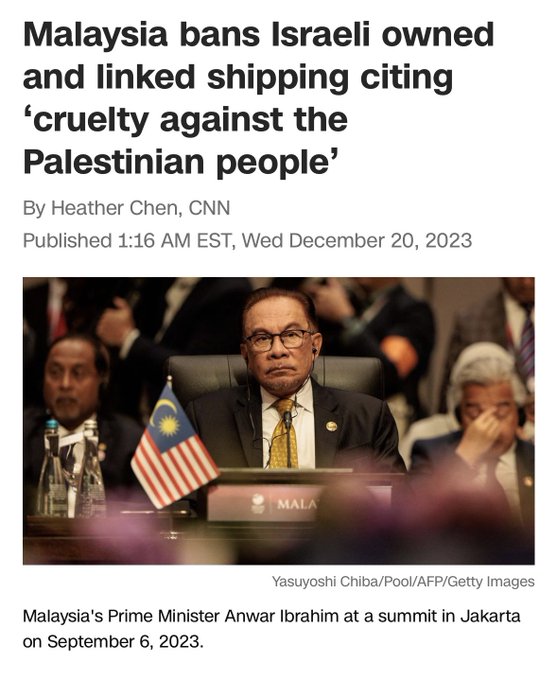
More telling:
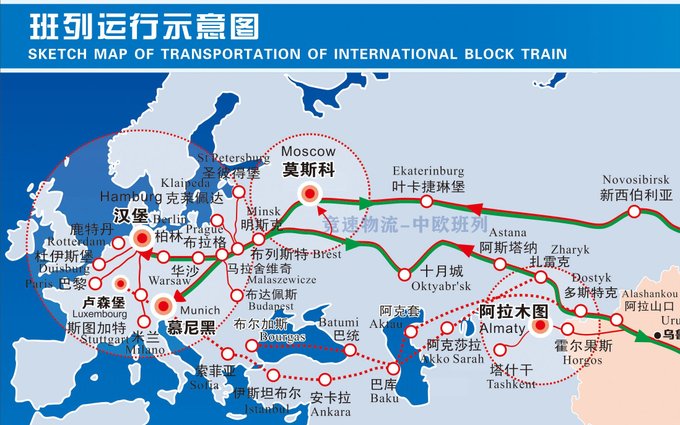
It has been an open secret even before the Millennium 2002 games, in which a Team Red almost sunk a pretend aircraft carrier in a very elaborately staged war games meant to simulate an attack on Iran, that those ships are big fat targets with little utility. The Millennium 2002 exercise further showed how vulnerable they were to low-tech attacks. Since then, great increases in surveillance technology, particularly drones, precision targeting, yet our surface ships seem not to have made commensurate advances.
(More at link: John Helmer work of yesterday.)
https://www.nakedcapitalism.com/2023/12 ... lanes.html

























